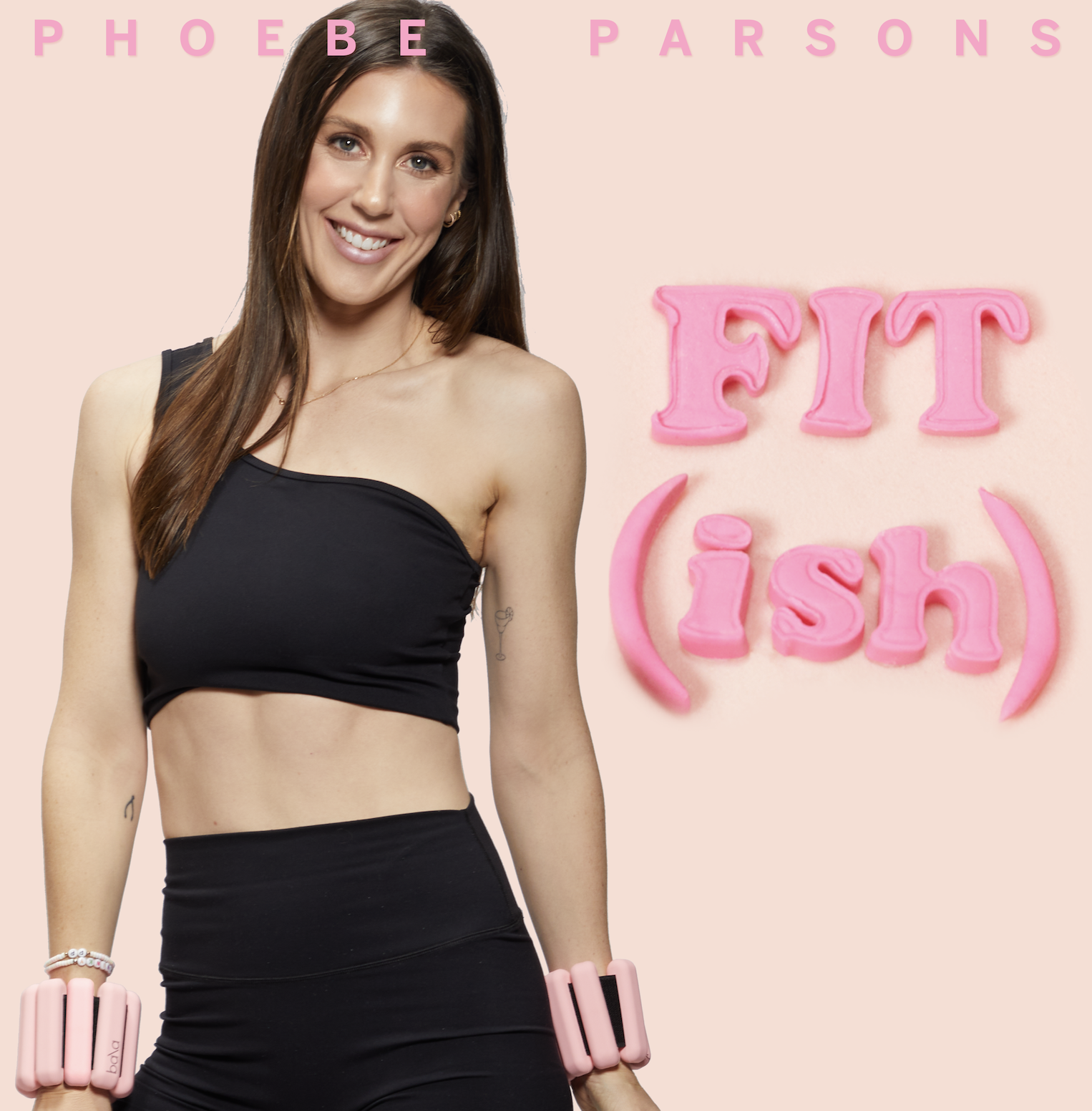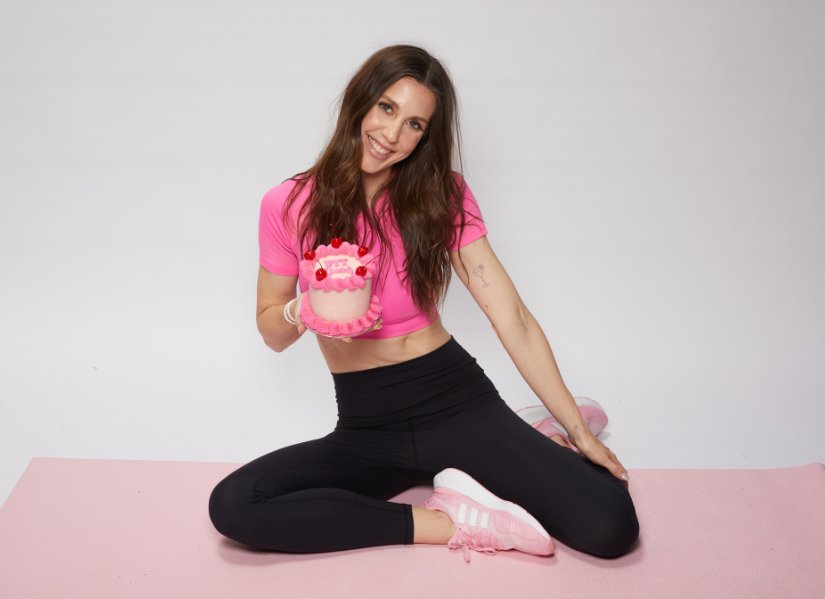
Charlotte McCullough, 4 April, 2024
In the dynamic world of podcasting, where voices vie for attention amidst a sea of digital content, Phoebe Parsons has emerged as a beacon of wellness advocacy. Having studied a Bachelor of Journalism at QUT, Phoebe serendipitously landed in the world of podcasting media with her FIT(ish) podcast. Her mission for FIT(ish) was to help listeners navigate the labyrinthine landscape of wellness, and be able to set achievable health and fitness goals.
Phoebe admits she loves the microphone and her blend of humour, self-acceptance, and a dose of pragmatism, has struck a chord with listeners for over seven years, leading to FIT(ish) topping podcast charts across Australia. Phoebe has generously shared some of her best advice for building a podcasting empire, and we invite you to join us as we learn from the Fit(ish) founder's path to podcast popularity…
 What inspired you to create the FIT(ish) podcast?
What inspired you to create the FIT(ish) podcast?
I’ve never met a mic I didn’t like, and I always wanted to work in radio. When I completed my journalism degree, I ended up working as a print journalist for a magazine but still had radio in the back of my mind. In 2017, just when podcasting slowly started to take off in Australia, Nova Entertainment had a competition running called Podquest, which was aimed at unearthing new unsigned talent. I threw my hat in the ring with an idea I had reserved for a book, but it ended up working in a podcast format. I somehow won the competition and Nova produced one season for me. It charted in Australia and New Zealand almost immediately, so I then signed on with Nova as a podcaster and ended up on weekend breakfast radio too!
My podcast has been running for nearly seven years now and it’s changed and evolved a lot in that time (including the name). It’s given me some incredible opportunities like radio and a Live Podcast Show at The Melbourne International Comedy Festival and I love the freedom and creativity you get to have with this form of content.
What strategies did you use to help FIT(ish) become the #1 health and fitness podcast in Australia?
Anyone can start a podcast, but not anyone can maintain longevity, which is the difference between it being a hobby and a job. Podcasting is a long game and if you want it to be successful there are so many factors you need to consider.
- First and foremost, you need to know your ‘why’ which will drive every single decision you make, from the topics you cover and the guests you interview to the length and frequency of your episodes.
- Next, you need an innate understanding of your audience: who and where they are, what they value, what they fear, what their behaviours are and what else they’re listening to. If you don’t know who they are, how will you know how to speak to them, and why would they be invested in what you have to say? The mistake a lot of people make is assuming they know who they’re talking to or creating content around their own interests, instead of their audiences.
- Finally, you need to ensure that whatever you’re creating content about truly aligns with your own beliefs and values. The way you interact with an audience on a podcast is so intimate and it’s very easy to tell if you’re faking it.
How do you navigate the balance of living a healthy lifestyle while advocating for self-acceptance and enjoying life's pleasures?
I didn’t have any balance for so many years and it's something I wish I had realised earlier. This is the exact reason I’m so passionate about normalising the fact that being fitish is enough. Maintaining good health is so important to live a full life, but on the quest for it so many people forget to enjoy life along the way. It’s not about the destination – FIT(ish) is all about the journey.

What would you say is the greatest misconception about wellness?
Social media has given everybody a platform to be an ‘expert.’ It frightens me to see people without qualifications in fitness or nutrition take advantage of their huge followings by promoting or selling things like workouts and meal plans to their impressionable audiences – it definitely happened to me when I was younger. We can be so easily influenced by what we see online, especially if the person promoting it has a body or lifestyle that we aspire to. I’ve really made it my mission to own up to my mistakes to create trust with my audience and to also interview highly qualified experts to deliver information to help you make informed decisions about your own health and wellness.
Looking ahead, what are the next trends we'll see in the wellness industry?
I think we’re going to see more people embracing balance and being more mindful and intentional with their health and wellness routines, as well as more focus on rest and relaxation. People aren’t interested in burning themselves out anymore with punishing workouts and gruelling schedules, and I think we’ll start to see more people choosing to do things from a place of positive intention rather than punishment.
With the rise of alternative wellness practices and holistic approaches to health, how do you see generational attitudes towards traditional healthcare systems changing?
I think more people will start to become proactive in taking measures to take control of their health and wellness holistically. I personally believe that alternative and traditional healthcare practises both have a place; it just comes down to seeking out education so you can make considered and informed decisions about what’s best for you and your body. Our generation are very savvy, and I absolutely love seeing more people actively seeking out self-development and improvement opportunities both physically and mentally to invest in their overall health in the long run.
How has your degree helped your career and shaped your approach to wellness journalism?
I can honestly say that my (QUT) journalism degree was one of the best decisions I ever made, and I don't think my podcast would be what or where it is today had I not completed it. I majored in broadcast and got so many incredible opportunities to not only craft practical things like my interviewing skills and voice coaching, but also getting to actually present gave me confidence and reiterated my love for storytelling – whatever the medium.
What is one skill you couldn’t live without, and why?
I couldn’t live without my ability to interview people, which is something that’s helped me in so many areas and aspects of my life - even outside of my career. It really is an art, and it goes so much more beyond just asking questions. It’s the rapport you build, the trust you cultivate and the ability to tap into and honour your intuition.
Phoebe Parsons
QUT degree - Bachelor of Journalism (2011)
Have a question for Phoebe? Connect with her on LinkedIn.
